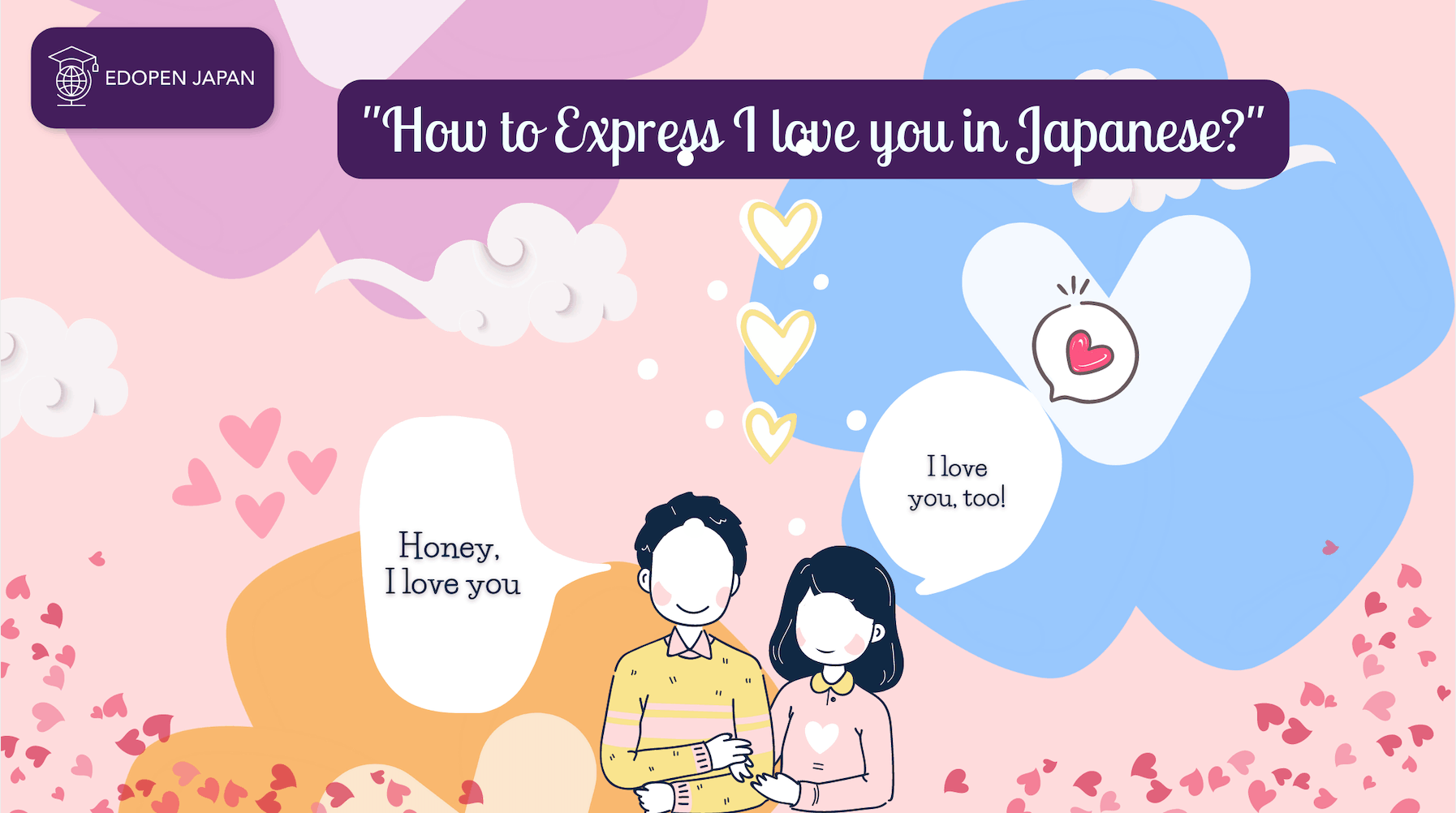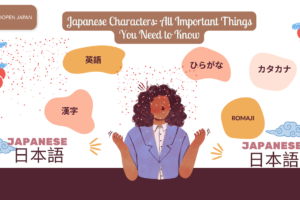In romantic Japanese anime, manga, movies, J-dramas, or even in any media platform that shows Japanese, you may be very familiar with this phrase, one of the most famous romantic Japanese phrases, “Ai shi te ru”.
Although it is very easy to know that the translation in English is “I love you”, it actually has so much deep and very emotional meaning.
After studying Japanese and living in Japan for several years, and having many conversations and discussions with Japanese people, you may feel so puzzled about the real meaning of “Aishiteru” and why the Japanese rarely use it in real life.
This time, let’s discuss the meaning of “Aishiteru” together and find out the reason why this phrase is not often used by the Japanese in everyday life.
You can also read our comprehensive discussion of some of the most common phrases used in everyday Japanese below:
Read also:
15 Great Ways to Say Thank You in Japanese
Everything You Need to Know about “Daijoubu (だいじょうぶ)”
How are You in Japanese
Contents
The meaning of “Aishiteru” in Japanese
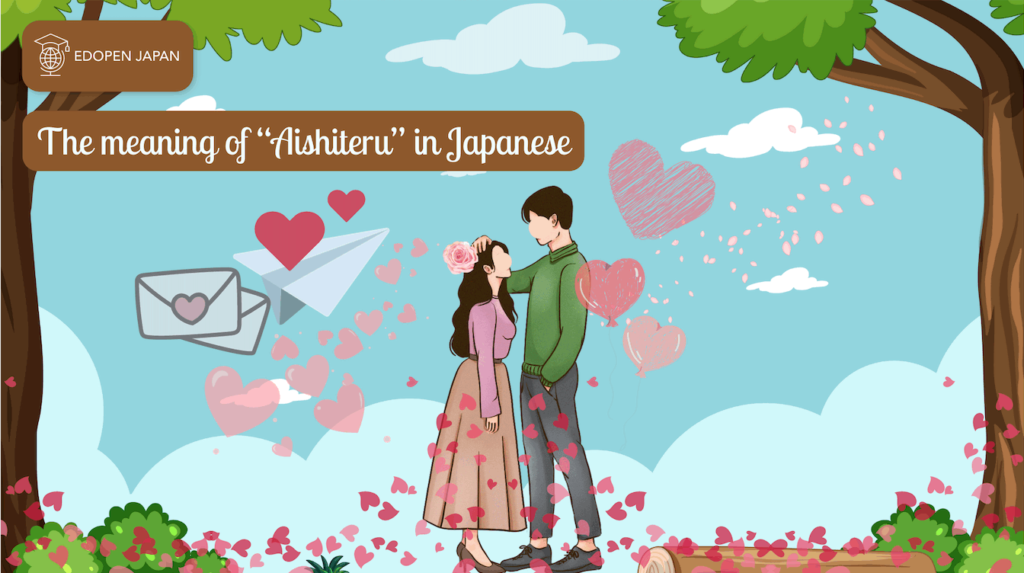
The phrase “aishiteru” in romaji or alphabet that we all know comes from the original kanji (Japanese characters) 愛 (ai) and follows with the hiragana (Japanese phonetic writing system) してる (shiteru). To know the exact meaning and structure of this sentence, we need to break it down further.
- 愛 (ai) is the first and only kanji for Aishiteru, meaning “love” in Japanese.
- してる (shiteru) or している (shiteiru) is the present continuous form of する (suru), which means “to do”. This part is in Aishiteru, which is usually written in hiragana rather than kanji. We can also write aishiteru in hiragana as あいしてる (aishiteru).
- してる (shiteru) is the しゃべり言葉 (syaberi kotoba), the spoken word of している (shiteiru). The expression “~teiru” is often expressed as “~teru” in spoken language, but this is only in spoken language and colloquialisms. When expressing it in written language, remember that it should correctly be expressed as “愛している (aishiteiru)” unless you have a special preference or occasion.
So, when we type this phrase into English using the translator and wanting the most literal meaning of it, then it actually means “loving” or “(I am) loving (you)”. Please note that the phrases in Japanese are different from those in English. In Japanese, the word “I” and “you” as subject and object are often considered implicit and unnecessary to use in everyday conversation.
Therefore, just saying the verbs is a very common way of speaking in Japanese real life, other than mentioning subject and object in every sentence they speak, whereas if you tried to add subject and object it would sound unnatural.
Moreover, when you hear 愛してる (aishiteru) said, you must understand that it actually means “I love you” (present continuous).
The phrases similar to 愛してる (aishiteru)
However, the message that the person wants to express is “I love you”. Here are the other phrases you may have heard that have the same meaning as 愛してる (aishiteru).
- 愛 (ai) means “love”.
- 愛する (aisuru) means “to love” or “to make love”. This is the dictionary form of “love” as a verb in Japanese.
- 愛している (aishiteiru) means “I love you”. This is the present continuous form in Japanese.
- 愛しています (aishiteimasu) also means “I love you”, as does 愛している (aishiteiru). However, this is a formal version.
- 愛した (aishita) means “I loved you”. This is the past tense in Japanese.
Then, please bear in mind that this phrase, 愛してる (aishiteru) is literally a very serious romantic phrase to express the extremely sincere love with such a deep meaning and special for the most loved one.
Although you may hear this phrase used or said very often in anime, song lyrics or J-dramas, in real life you will rarely hear it said by the Japanese. Instead of hearing 愛してる (aishiteru), you will hear them say 好き (suki) or 大好き (daisuki) a lot, which means “I like you or I like you a lot”.
When the Japanese say “Aishiteru”?
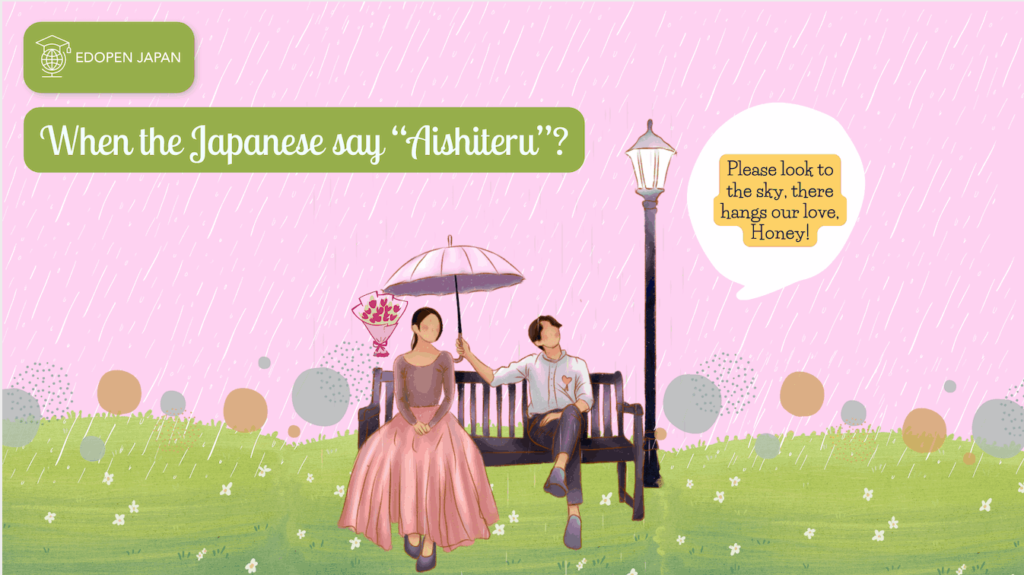
As we have already discussed, in real life for the Japanese this phrase is a very deep and serious expression of love. For them, this phrase is not said very often or even very rarely because of this condition.
Not only can it be expressed for someone we love romantically, but this phrase can also be used for a very close family member. Considering how deep, serious and precious this word is, it can even be heard as a final “goodbye” to or from someone you care about most in your life.
The Japanese phrase 愛してる (aishiteru) can be seen as a very sincere and deep feeling for one and another that is only expressed when someone expresses their very deep and serious love and respect in a long-term and permanent relationship.
The present continuous form “愛してる or loving” is used to emphasise the ongoing (everlasting) deep statement or expression of feelings. So when would the Japanese say 愛してる (aishiteru) to express their feelings? Only in the following situations:
- Expressed with the hope of a long and lasting relationship, for example at a wedding.
- Written as a final farewell to someone you have loved the most, when you are saying goodbye after a long time.
Why is “Aishiteru” rarely said in real life?
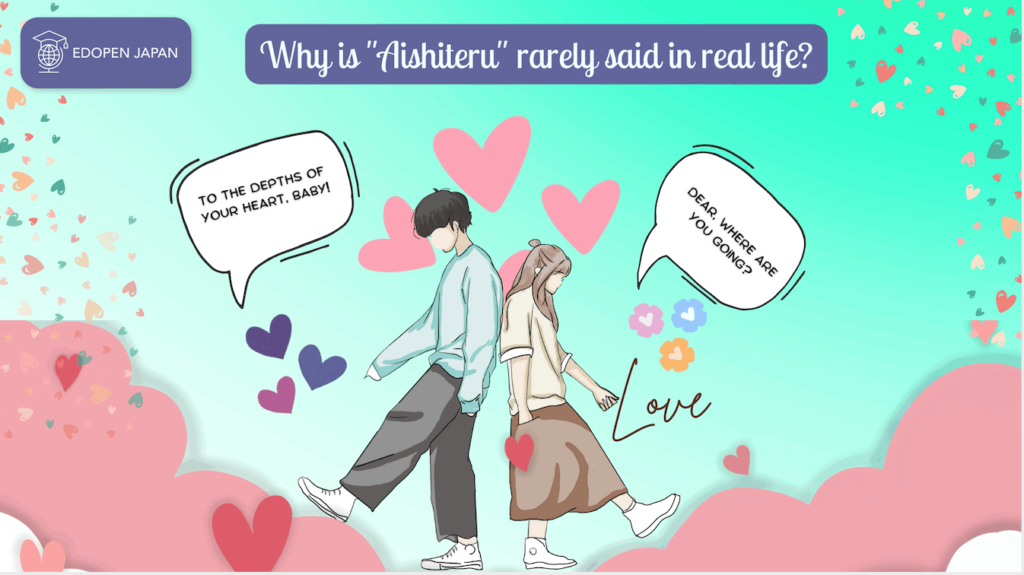
As we have discussed above, the meaning of 愛してる (aishiteru) is very serious. We can assume that in reality this phrase is not used so often or even very rarely because of the cultural and linguistic differences of the Japanese. Then let’s talk about what is the reason why the Japanese do not use this word so often even for their girlfriend, not like 大好き (daisuki) or 好き (suki) which are more familiar and appropriate in some occasions.
According to Sugoren, a famous Japanese dating site, they conducted an online survey in 2014, asking 165 bachelors in their teens and twenties why they don’t say “ai shiteru” to their girlfriends. As a result, there are 9 patterns of reasons that emerged as the following answers:
- It’s a special word, not to be used lightly.
- If you said it, the shy and embarrassed feeling would come first, so much better to avoid this word.
- It is too early to say.
- It is because 好き (suki) is nicer than 愛してる (aishiteru).
- Because they want to maintain the image of a cool guy who doesn’t fall in love.
- They still don’t know what ‘love’ really is and need more time to know and find out more.
- You don’t want to make the girl feel too flirty by saying 愛してる (aishiteru).
- Some of them also feel that their affection has already faded and they want to avoid the word being used as a lie.
- Because they think the girl already knows, so there is no need to say it out loud.
What about you? Would you think the same way as Japanese men? Or would you just tell your loved one? Share your thoughts with us!
How to use “Aishiteru”
In Japanese culture, straightforward expressions are not familiar. For them, 愛してる (aishiteru) is a very special expression. On the other hand, they also think that this phrase is an abstract word that can be used in a broad sense and needs very detailed explanations and actions to show it.
There are different forms of love for us to consider, such as love, romance, respect and also charity. If we think of it in a broader sense, this word can be used not only for people, but is also very applicable to anything such as our passion, work, hometown, etc.
The meaning of the word “Aishiteru” would also change depending on the context and situation. Managing this word very carefully as Japanese does is a very nice thing to know as well as trying to say this for everyone to thank or show our gratitude for someone who has presented their time to chat us asking our conditions in this pandemic situations as small as their 5 minutes time for you would be very awesome too.
The similar phrases with “Aishiteru”
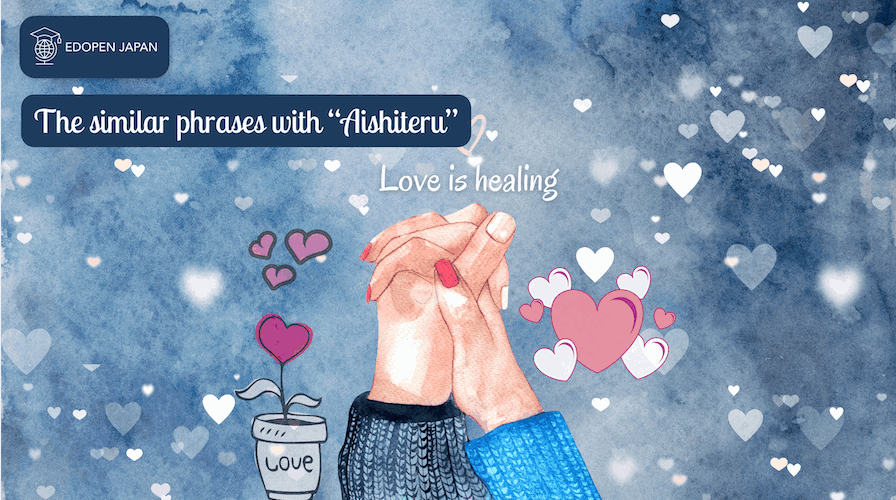
In this section, to broaden your preference for the word 愛してる (aishiteru), you can look for the following phrases that would suit your occasions that has a similar meaning with aishiteru:
- 大事に思う (daiji ni omou), this phrase means “I will keep this precious!
- 大切に思う (taisetsu ni omou), which means “I would consider this important!”
- 守りたいと思う (mamoritai to omou), means “I will protect you”.
- 慈しむ (itsukushimu), which means “I love you and cherish you!”
- 愛好する (aikou suru), this phrase means “I love and like you”.
After reading this, please feel free to use the Japanese phrases above to express your love, appreciation or respect for your loved one in Japanese. This will make your expression of love very memorable and unique.
The example of sentences using “Aishiteru”
To know more about how to use 愛してる (aishiteru) in everyday conversation that you may wonder how to use it practically, please go through the following sample sentences that can be used to express the love with 愛してる (aishiteru) phrase in it.
| Example in Japanese | How to read in alphabet | Meaning in English |
| 1.「本当に君を愛してるからなんだ。」 | Hontōni kimi o ai shiteru kara nanda. | “I really love you.“ |
| 2.「愛してるということさえも考えない。」 | Ai shiteru to iu koto sae mo kanggaenai. | “I don’t even think about the matter of loving (someone)“ |
| 3.「あなたは一体山田先生を愛してるのですか」 | Anata wa ittai yamada sensei o ai shiteru nodesu ka? | “Do you really love Yamada sensei?“ |
| 4.「愛してる様子を示すこともできなかった。」 | Ai shiteru yōsu o shimesu koto mo dekinakatta. | “I couldn’t even show how I love you.“ |
| 5.「母親を愛してる息子(むすこ)は俺だけだ。」 | Hahaoya o ai shiteru musuko (musuko) wa ore dakeda. | “The only son who loves mother is Me.“ |
Do you have any other examples? Please share them in the comments section below!
Conclusion
Well, after examining the new facts about the meaning of 愛してる (ai shiteru) in Japanese from different perspectives, we can conclude as follows:
- Unlike in English, the phrase “愛して, Ai shiteru, I love you in Japanese” actually has such a deep and very emotional meaning.
- Considering how deep and precious the phrase Ai shiteru is, it can even be heard as a final ‘goodbye’.
The meaning of the word “Ai shiteru” would also change depending on the context and situation.

